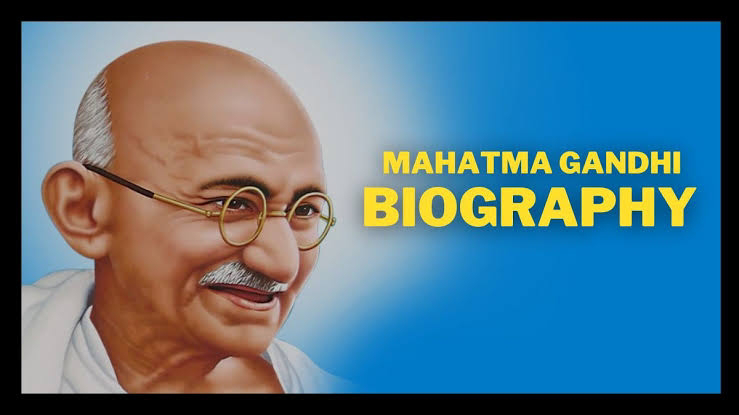MAHATMA GANDHI
Mahatma Gandhi, whose full name was Mohandas Karamchand Gandhi, is one of the most revered figures in India's history and a prominent leader in the fight for India's independence from British colonial rule. Here is a brief overview of his life:
**Early Life and Education:**
- Mohandas Karamchand Gandhi was born on October 2, 1869, in Porbandar, a coastal town in Gujarat, India.
- He came from a modest background and was influenced by his mother's religious and ethical teachings.
**Education and Early Career:**
- Gandhi studied law in London and then worked as a lawyer in South Africa.
- In South Africa, he experienced racial discrimination, which led to his activism against such injustices.
**Champion of Nonviolent Resistance:**
- Gandhi is best known for his philosophy of nonviolent resistance, which he called "Satyagraha."
- He believed in peaceful civil disobedience and used it as a powerful tool in the struggle for justice and independence.
**Role in India's Independence Movement:**
- Gandhi returned to India in 1915 and soon became a leader in the Indian National Congress.
- He organized numerous nonviolent campaigns, including the Salt March, Quit India Movement, and the Non-Cooperation Movement, to protest British rule.
**Achievement of Indian Independence:**
- India finally achieved independence from British colonial rule on August 15, 1947.
- Gandhi's tireless efforts and commitment to nonviolence played a crucial role in this historic achievement.
**Legacy:**
- Mahatma Gandhi is often referred to as the "Father of the Nation" in India.
- His principles of nonviolence, truth, and social justice continue to inspire movements for civil rights and freedom worldwide.
- Gandhi's life and teachings had a profound impact on the world and remain relevant in today's struggles for justice and peace.
**Assassination:**
- Tragically, Mahatma Gandhi was assassinated on January 30, 1948, by Nathuram Godse, a Hindu nationalist who opposed Gandhi's views and actions.
Gandhi's life and work are celebrated not only in India but throughout the world. His commitment to nonviolence, civil rights, and social justice continues to be a source of inspiration for people advocating for positive change and peaceful resistance.
HINDI VIEWERS
महात्मा गांधी, जिनका पूरा नाम मोहनदास करमचंद गांधी था, भारत के इतिहास में सबसे प्रतिष्ठित शख्सियतों में से एक हैं और ब्रिटिश औपनिवेशिक शासन से भारत की आजादी की लड़ाई में एक प्रमुख नेता थे। यहां उनके जीवन का संक्षिप्त विवरण दिया गया है:
**प्रारंभिक जीवन और शिक्षा:**
- मोहनदास करमचंद गांधी का जन्म 2 अक्टूबर, 1869 को भारत के गुजरात के एक तटीय शहर पोरबंदर में हुआ था।
- वह एक साधारण पृष्ठभूमि से आए थे और अपनी मां की धार्मिक और नैतिक शिक्षाओं से प्रभावित थे।
**शिक्षा और प्रारंभिक कैरियर:**
- गांधीजी ने लंदन में कानून की पढ़ाई की और फिर दक्षिण अफ्रीका में वकील के रूप में काम किया।
- दक्षिण अफ्रीका में, उन्होंने नस्लीय भेदभाव का अनुभव किया, जिसके कारण इस तरह के अन्याय के खिलाफ उनकी सक्रियता बढ़ी।
**अहिंसक प्रतिरोध का चैंपियन:**
- गांधी को उनके अहिंसक प्रतिरोध के दर्शन के लिए जाना जाता है, जिसे उन्होंने "सत्याग्रह" कहा।
- वह शांतिपूर्ण सविनय अवज्ञा में विश्वास करते थे और इसे न्याय और स्वतंत्रता के संघर्ष में एक शक्तिशाली उपकरण के रूप में इस्तेमाल करते थे।
**भारत के स्वतंत्रता आंदोलन में भूमिका:**
- 1915 में गांधी भारत लौट आए और जल्द ही भारतीय राष्ट्रीय कांग्रेस के नेता बन गए।
- उन्होंने ब्रिटिश शासन का विरोध करने के लिए नमक मार्च, भारत छोड़ो आंदोलन और असहयोग आंदोलन सहित कई अहिंसक अभियान चलाए।
**भारतीय स्वतंत्रता की उपलब्धि:**
- भारत ने अंततः 15 अगस्त, 1947 को ब्रिटिश औपनिवेशिक शासन से स्वतंत्रता प्राप्त की।
- गांधीजी के अथक प्रयासों और अहिंसा के प्रति प्रतिबद्धता ने इस ऐतिहासिक उपलब्धि में महत्वपूर्ण भूमिका निभाई।
**परंपरा:**
- भारत में महात्मा गांधी को अक्सर "राष्ट्रपिता" कहा जाता है।
- अहिंसा, सत्य और सामाजिक न्याय के उनके सिद्धांत दुनिया भर में नागरिक अधिकारों और स्वतंत्रता के लिए आंदोलनों को प्रेरित करते हैं।
- गांधी के जीवन और शिक्षाओं का दुनिया पर गहरा प्रभाव पड़ा और वे न्याय और शांति के लिए आज के संघर्षों में भी प्रासंगिक बने हुए हैं।
**हत्या:**
- दुखद बात यह है कि 30 जनवरी, 1948 को नाथूराम गोडसे, एक हिंदू राष्ट्रवादी, जिसने गांधी के विचारों और कार्यों का विरोध किया था, द्वारा महात्मा गांधी की हत्या कर दी गई थी।
गांधी जी का जीवन और कार्य न केवल भारत में बल्कि पूरे विश्व में मनाया जाता है। अहिंसा, नागरिक अधिकारों और सामाजिक न्याय के प्रति उनकी प्रतिबद्धता सकारात्मक परिवर्तन और शांतिपूर्ण प्रतिरोध की वकालत करने वाले लोगों के लिए प्रेरणा का स्रोत बनी हुई है।





Post a Comment